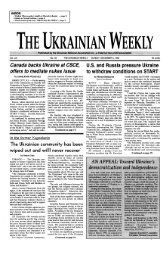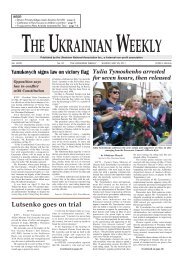1_January 6, 2002 - The Ukrainian Weekly
1_January 6, 2002 - The Ukrainian Weekly
1_January 6, 2002 - The Ukrainian Weekly
You also want an ePaper? Increase the reach of your titles
YUMPU automatically turns print PDFs into web optimized ePapers that Google loves.
40 THE UKRAINIAN WEEKLY SUNDAY, JANUARY 6, <strong>2002</strong><br />
No. 1<br />
2001: THE YEAR IN REVIEW<br />
and that it would concentrate too much power in too<br />
few hands as it would take only six votes (out of the 11member<br />
board) to control the entire organization.<br />
Finally, there were also those who urged a “no” vote<br />
on the mail-in ballot for the simple reason that they<br />
believed such a monumental change should be discussed<br />
openly at a full-scale UNA convention, where all<br />
the delegates have the advantage of hearing each other’s<br />
opinions – pro and con – on issues of critical importance<br />
to the UNA’s future. Advisor Alexander Chudolij<br />
wrote: “An exchange of ideas among convention delegates<br />
is, in my opinion, the best, fairest and most democratic<br />
way for any or all of the delegates to be heard –<br />
both leading up to and during the actual vote. Every delegate<br />
is in attendance and already sitting in the same<br />
convention hall. It is the perfect setting for an exchange<br />
of views, opinions and understanding of the issue at<br />
hand. In fact, it’s exactly what conventions are for!”<br />
“Furthermore,” he argued, “I have always believed that<br />
it does not matter as much what type of system we use<br />
to elect our UNA leaders, but that it matters whom we<br />
elect and what resources they have to get the job done.<br />
Does anyone really think that all of our problems will<br />
turn around if we elect a board of directors?”<br />
<strong>The</strong> ballots were to be returned by May 1, whereupon<br />
they were tabulated by members of the UNA Auditing<br />
Committee on May 8.<br />
A report signed for the Auditing Committee by<br />
William Pastuszek, chairman; Stefan Hawrysz, vicechairman;<br />
Dr. Alexander J. Serafyn, secretary; Myron<br />
Groch and Yaroslav Zaviysky, members; noted that a<br />
total of 179 ballots was received, which represented<br />
76.8 percent of the 233 eligible votes. <strong>The</strong> results of the<br />
vote was: for adopting the by-laws changes, 106;<br />
against, 70. Three ballots were ruled invalid (two were<br />
returned empty and one was damaged). In order for the<br />
by-laws proposal to pass 155 “yes” votes – two-thirds<br />
of the eligible votes – were required. Fifty-four eligible<br />
voters, or 23.2 percent of the total eligible, did not register<br />
a vote. Thus the proposal to alter the UNA’s governance<br />
structure to a corporate model failed to pass.<br />
On the financial front, 2001 was a turnaround year. At<br />
the March 24 meeting of the UNA Executive Committee<br />
– the first of 2001, it was reported by Mr. Kaczaraj that<br />
the UNA had ended the year 2000 with the lowest deficit<br />
in over 10 years. <strong>The</strong> greatly improved financial status of<br />
the UNA was mainly due to the reduction in the deficits<br />
of its publications and a reduction in operating expenses.<br />
<strong>The</strong> publications had an overall deficit of $175,000 for<br />
the year 2000, while the deficit in 1999 was $246,000.<br />
<strong>The</strong> <strong>Ukrainian</strong> National Urban Renewal Corp. showed a<br />
profit for the year 2000 in the amount of $107,000. <strong>The</strong><br />
UNA had unrealized losses of $383,000 due to the weakness<br />
in the Canadian dollar. Soyuzivka remains the<br />
UNA’s biggest financial burden; the deficit from<br />
Soyuzivka was $579,000 for the year 2000. Mr. Kaczaraj<br />
concluded by reporting that the overall decrease in surplus<br />
for 2000 was $188,000.<br />
In December at the annual meeting of the UNA<br />
General Assembly, Treasurer Kaczaraj reported good<br />
news about growth in the UNA’s surplus: during the<br />
first nine months of 2001 the surplus increased by $1<br />
million to $7,791,225. Other positives included the<br />
UNA’s very strong solvency ratio of 114 percent (that<br />
is, $114 to cover each $100 of liabilities, as compared<br />
with the $105 average for the top 25 insurance companies);<br />
the expectation that the net profit of the UNA’s<br />
building corporation, the <strong>Ukrainian</strong> National Urban<br />
Renewal Corp., would be $350,000 in the year <strong>2002</strong>;<br />
and the reduction of the UNA publications’ deficit to the<br />
“manageable level” of $86,455 for the first nine months<br />
of this year.<br />
Mr. Kaczaraj tempered his optimism, however, as he<br />
spoke of Soyuzivka, which recorded a deficit of nearly<br />
$462,000 during the first three quarters of 2001. He<br />
concluded his report by underscoring that “we have to<br />
solve Soyuzivka’s problems and increase sales of insurance.”<br />
At the first executive committee meeting for 2001,<br />
National Secretary Lysko reported that total UNA membership<br />
for the year 2000 stood at 50,689 members:<br />
25,685 premium-paying members and 25,004 paid-up<br />
members. At the yearend annual meeting of the UNA<br />
General Assembly, Mrs. Lysko reported a total UNA<br />
membership of 48,536, with a net loss of 2,170 members<br />
as of the end of the third quarter. She noted that the<br />
UNA now has no professional sales forces and that<br />
branch secretaries are aging and are no longer as active<br />
as they once were in enrolling new members.<br />
<strong>The</strong> fate of Soyuzivka was very much on the minds<br />
of UNAers and on the agenda of its leadership.<br />
During its annual meeting held in December 2000,<br />
the General Assembly of the <strong>Ukrainian</strong> National<br />
Association had commissioned a standing committee to<br />
prepare a comprehensive analysis of the state of affairs<br />
of the <strong>Ukrainian</strong> National Association’s resort,<br />
Soyuzivka. <strong>The</strong> committee analyzed the situation facing<br />
the resort, and reached a number of conclusions regarding<br />
its future that were set forth in a 12-page report<br />
delivered to the Executive Committee in late April of<br />
this year, and in an enhanced report submitted in early<br />
July. (<strong>The</strong> work of several committee members, foremost<br />
among them Stefko Kuropas, Taras Szmagala,<br />
Alexander Chudolij, Wasyl Szeremeta. <strong>The</strong> report was<br />
divided into four sections: physical plant (summarizing<br />
necessary building renovations and reconstruction),<br />
financing alternatives (including charitable and forprofit<br />
capitalization options), operating analysis (including<br />
profit and loss projections) and future actions needed<br />
to be taken by the Executive Committee. <strong>The</strong> committee<br />
made a number of recommendations on improvements,<br />
including both renovations and additions to the<br />
resort that would cost $4.2 million to complete, but<br />
which it considered “absolutely necessary for<br />
Soyuzivka to attract guests at a rate to enable it to operate<br />
at a break-even basis or better.”<br />
<strong>The</strong> committee also examined several options,<br />
including for-profit and non-profit structures, with the<br />
latter seen as preferable. Under the non-profit approach,<br />
the UNA would transfer Soyuzivka into a not-for-profit<br />
foundation organized under Section 501(c)(3) of the<br />
Internal Revenue Code. Such an entity would conceivably<br />
be able to both accept charitable contributions and<br />
attract strategic capital. Indeed, the UNA General<br />
Assembly’s annual meeting in December concurred<br />
with the non-profit approach.<br />
<strong>The</strong> report concluded: “On a going forward basis, the<br />
committee noted the need to follow-up on four areas:<br />
(a) identifying professional assistance in attracting charitable<br />
donations, (b) identifying interested institutional<br />
donors, (c) identifying candidates for third party management,<br />
and (d) finalizing the position of the state<br />
insurance commission on the committee’s recommendations.”<br />
At its December 2001 annual meeting the General<br />
Assembly authorized the Executive Committee, together<br />
with the Standing Committee on Soyuzivka, to obtain<br />
legal counsel and engage a resort consultant regarding<br />
options for the future of Soyuzivka, and to report back<br />
to the General Assembly by mid-<strong>January</strong>.<br />
<strong>The</strong> UNA recorded several sad losses during 2001:<br />
the deaths of three honorary members of the General<br />
Assembly with a total of 93 years of active service to<br />
the UNA among them. Walter Sochan, supreme secretary<br />
and an executive officer (vice-president and recording<br />
secretary, 1966-1974 and later supreme secretary<br />
1974-1994) for 28 years, plus another 17 years as an<br />
employee of the Home Office, and honorary member<br />
since 1994 died on May 23 at age 77. John O. Flis, former<br />
three-term supreme president (1978-1990) and oneterm<br />
vice-president (1974-1978) and honorary member<br />
since 1990, died on June 8 at age 78. Stephen Kuropas,<br />
supreme auditor for 25 years (1937-1961) then supreme<br />
vice-president for eight years, (1961-1970) and honorary<br />
member since 1970, died on August 11 at age 100.<br />
In February we reported on one of the UNA’s most<br />
promising programs. To help Ukraine’s disadvantaged<br />
rural youths, the UNA decided to give 10 such youths a<br />
chance at a college education at one of Ukraine’s most<br />
prestigious academic institutions. After discussions with<br />
the National University of Kyiv Mohyla Academy, the<br />
UNA, through its <strong>Ukrainian</strong> National Foundation,<br />
agreed to pay the $1,000 tuition for each of five boys<br />
and five girls from villages in central and eastern<br />
Ukraine to take part in college preparatory courses at<br />
the university – rated for the last several years as one of<br />
the top two centers of academic study in Ukraine. <strong>The</strong><br />
semester-long college preparatory course puts prospective<br />
students on the university’s campus and in its dormitories<br />
as they take part in a pre-college level curriculum<br />
that teaches required subjects, in the physical sciences<br />
as well as the humanities, and is aimed at helping<br />
them pass the school’s entrance examination.<br />
<strong>The</strong> UNA programs continued its Scholarship<br />
Program in 2001. In September it was announced that<br />
more than $16,000 in scholarships was awarded to 129<br />
college students throughout the United States and<br />
Canada for the 2001-<strong>2002</strong> academic year.<br />
This year’s UNA scholarships add to the more than<br />
$1.78 million awarded by the UNA since 1946, continuing<br />
its tradition of supporting the education and development<br />
of today’s <strong>Ukrainian</strong> American and <strong>Ukrainian</strong><br />
Canadian youth.<br />
<strong>The</strong> Scholarship Committee awarded $100 to each of<br />
36 incoming freshmen, $125 to each of 30 sophomores,<br />
$150 to each of 25 juniors and $175 to each of 29 sen-<br />
Three stalwarts of the <strong>Ukrainian</strong> National Association who passed away in 2001: executive officers Walter Sochan, John O. Flis and Stephen Kuropas.

















